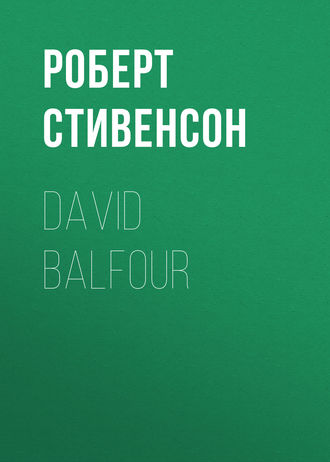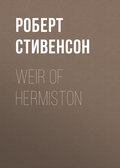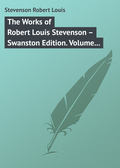
Роберт Льюис Стивенсон
David Balfour
CHAPTER XXII
HELVOETSLUYS
The weather in the end considerably worsened; the wind sang in the shrouds, the sea swelled higher, and the ship began to labour and cry out among the billows. The song of the leadsman in the chains was now scarce ceasing, for we thrid all the way among shoals. About nine in the morning, in a burst of wintry sun between two squalls of hail, I had my first look of Holland-a line of windmills birling in the breeze. It was besides my first knowledge of these daft-like contrivances, which gave me a near sense of foreign travel and a new world and life. We came to an anchor about half-past eleven, outside the harbour of Helvoetsluys, in a place where the sea sometimes broke and the ship pitched outrageously. You may be sure we were all on deck save Mrs. Gebbie, some of us in cloaks, others mantled in the ship's tarpaulins, all clinging on by ropes, and jesting the most like old sailor-folk that we could imitate.
Presently a boat, that was backed like a partan-crab, came gingerly alongside, and the skipper of it hailed our master in the Dutch. Thence Captain Sang turned, very troubled like, to Catriona; and the rest of us crowding about, the nature of the difficulty was made plain to all. The Rose was bound to the port of Rotterdam, whither the other passengers were in a great impatience to arrive, in view of a conveyance due to leave that very evening in the direction of the Upper Germany. This, with the present half-gale of wind, the captain (if no time were lost) declared himself still capable to save. Now James More had trysted in Helvoet with his daughter, and the captain had engaged to call before the port and place her (according to the custom) in a shore boat. There was the boat, to be sure, and there was Catriona ready: but both our master and the patroon of the boat scrupled at the risk, and the first was in no humour to delay.
"Your father," said he, "would be gey an little pleased if we was to break a leg to ye, Miss Drummond, let-a-be drowning of you. Take my way of it," says he, "and come on-by with the rest of us here to Rotterdam. Ye can get a passage down the Maes in a sailing scoot as far to the Brill, and thence on again, by a place in a rattel-waggon, back to Helvoet."
But Catriona would hear of no change. She looked white-like as she beheld the bursting of the sprays, the green seas that sometimes poured upon the forecastle, and the perpetual bounding and swooping of the boat among the billows; but she stood firmly by her father's orders. "My father, James More, will have arranged it so," was her first word and her last. I thought it very idle and indeed wanton in the girl to be so literal and stand opposite to so much kind advice; but the fact is she had a very good reason, if she would have told us. Sailing scoots and rattel-waggons are excellent things; only the use of them must first be paid for, and all she was possessed of in the world was just two shillings and a penny halfpenny sterling. So it fell out that captain and passengers, not knowing of her destitution-and she being too proud to tell them-spoke in vain.
"But you ken nae French and nae Dutch neither," said one.
"It is very true," says she, "but since the year '46 there are so many of the honest Scots abroad that I will be doing very well, I thank you."
There was a pretty country simplicity in this that made some laugh, others looked the more sorry, and Mr. Gebbie fall outright in a passion. I believe he knew it was his duty (his wife having accepted charge of the girl) to have gone ashore with her and seen her safe; nothing would have induced him to have done so, since it must have involved the loss of his conveyance; and I think he made it up to his conscience by the loudness of his voice. At least he broke out upon Captain Sang, raging and saying the thing was a disgrace; that it was mere death to try to leave the ship, and at any event we could not cast down an innocent maid in a boatful of nasty Holland fishers, and leave her to her fate. I was thinking something of the same; took the mate upon one side, arranged with him to send on my chests by track-scoot to an address I had in Leyden, and stood up and signalled to the fishers.
"I will go ashore with the young lady, Captain Sang," said I. "It is all one what way I go to Leyden;" and leaped at the same time into the boat, which I managed not so elegantly but what I fell with two of the fishers in the bilge.
From the boat the business appeared yet more precarious than from the ship, she stood so high over us, swung down so swift, and menaced us so perpetually with her plunging and passaging upon the anchor cable. I began to think I had made a fool's bargain, that it was merely impossible Catriona should be got on board to me, and that I stood to be set ashore at Helvoet all by myself and with no hope of any reward but the pleasure of embracing James More, if I should want to. But this was to reckon without the lass's courage. She had seen me leap with very little appearance (however much reality) of hesitation; to be sure, she was not to be beat by her discarded friend. Up she stood on the bulwarks and held by a stay, the wind blowing in her petticoats, which made the enterprise more dangerous and gave us rather more of a view of her stockings than would be thought genteel in cities. There was no minute lost, and scarce time given for any to interfere if they had wished the same. I stood up on the other side and spread my arms; the ship swung down on us, the patroon humoured his boat nearer in than was perhaps wholly safe, and Catriona leaped into the air. I was so happy as to catch her, and the fishers readily supporting us, escaped a fall. She held to me a moment very tight, breathing quick and deep; thence (she still clinging to me with both hands) we were passed aft to our places by the steersman; and Captain Sang and all the crew and passengers cheering and crying farewell, the boat was put about for shore.
As soon as Catriona came a little to herself she unhanded me suddenly but said no word. No more did I; and indeed the whistling of the wind and the breaching of the sprays made it no time for speech; and our crew not only toiled excessively but made extremely little way, so that the Rose had got her anchor and was off again before we had approached the harbour mouth.
We were no sooner in smooth water than the patroon, according to their beastly Hollands custom, stopped his boat and required of us our fares. Two guilders was the man's demand, between three and four shillings English money, for each passenger. But at this Catriona began to cry out with a vast deal of agitation. She had asked of Captain Sang, she said, and the fare was but an English shilling. "Do you think I will have come on board and not ask first?" cries she. The patroon scolded back upon her in a lingo where the oaths were English and the rest right Hollands; till at last (seeing her near tears) I privately slipped in the rogue's hand six shillings, whereupon he was obliging enough to receive from her the other shilling without more complaint. No doubt I was a good deal nettled and ashamed. I like to see folk thrifty but not with so much passion; and I daresay it would be rather coldly that I asked her, as the boat moved on again for shore, where it was that she was trysted with her father.
"He is to be inquired of at the house of one Sprott, an honest Scotch merchant," says she; and then with the same breath, "I am wishing to thank you very much-you are a brave friend to me."
"It will be time enough when I get you to your father," said I, little thinking that I spoke so true. "I can tell him a fine tale of a loyal daughter."
"O, I do not think I will be a loyal girl, at all events," she cried, with a great deal of painfulness in the expression. "I do not think my heart is true."
"Yet there are very few that would have made that leap, and all to obey a father's orders," I observed.
"I cannot have you to be thinking of me so," she cried again. "When you had done that same, how would I stop behind? And at all events that was not all the reasons." Whereupon, with a burning face, she told me the plain truth upon her poverty.
"Good guide us!" cried I, "what kind of daft-like proceeding is this, to let yourself be launched on the continent of Europe with an empty purse-I count it hardly decent-scant decent!" I cried.
"You forget James More, my father, is a poor gentleman," said she. "He is a hunted exile."
"But I think not all your friends are hunted exiles," I exclaimed. "And was this fair to them that care for you? Was it fair to me? was it fair to Miss Grant that counselled you to go, and would be driven fair horn-mad if she could hear of it? Was it even fair to these Gregory folk that you were living with, and used you lovingly? It's a blessing you have fallen in my hands! Suppose your father hindered by an accident, what would become of you here, and you your lee-alone in a strange place? The thought of the thing frightens me," I said.
"I will have lied to all of them," she replied. "I will have told them all that I had plenty. I told her too. I could not be lowering James More to them."
I found out later on that she must have lowered him in the very dust, for the lie was originally the father's not the daughter's, and she thus obliged to persevere in it for the man's reputation. But at the time I was ignorant of this, and the mere thought of her destitution and the perils in which she must have fallen, had ruffled me almost beyond reason.
"Well, well, well," said I, "you will have to learn more sense."
I left her mails for the moment in an inn upon the shore, where I got a direction for Sprott's house in my new French, and we walked there-it was some little way-beholding the place with wonder as we went. Indeed, there was much for Scots folk to admire; canals and trees being intermingled with the houses; the houses, each within itself, of a brave red brick, the colour of a rose, with steps and benches of blue marble at the cheek of every door, and the whole town so clean you might have dined upon the causeway. Sprott was within, upon his ledgers, in a low parlour, very neat and clean, and set out with china and pictures and a globe of the earth in a brass frame. He was a big-chafted, ruddy, lusty man, with a crooked hard look to him; and he made us not that much civility as offer us a seat.
"Is James More Macgregor now in Helvoet, sir?" says I.
"I ken nobody by such a name," says he, impatient-like.
"Since you are so particular," says I, "I will amend my question, and ask you where we are to find in Helvoet one James Drummond, alias Macgregor, alias James More, late tenant in Iveronachile?"
"Sir," says he, "he may be in Hell for what I ken, and for my part I wish he was."
"The young lady is that gentleman's daughter, sir," said I, "before whom, I think you will agree with me, it is not very becoming to discuss his character."
"I have nothing to make either with him, or her, or you!" cries he in his gross voice.
"Under your favour, Mr. Sprott," said I, "this young lady is come from Scotland seeking him, and by whatever mistake, was given the name of your house for a direction. An error it seems to have been, but I think this places both you and me-who am but her fellow-traveller by accident-under a strong obligation to help our countrywoman."
"Will you ding me daft?" he cries. "I tell ye I ken naething and care less either for him or his breed. I tell ye the man owes me money."
"That may very well be, sir," said I, who was now rather more angry than himself. "At least I owe you nothing; the young lady is under my protection; and I am neither at all used with these manners, nor in the least content with them."
As I said this, and without particularly thinking what I did, I drew a step or two nearer to his table; thus striking, by mere good fortune, on the only argument that could at all affect the man. The blood left his lusty countenance.
"For the Lord's sake dinna be hasty, sir!" he cried. "I am truly wishfu' no to be offensive. But ye ken, sir, I'm like a wheen guid-natured, honest, canty auld fallows-my bark is waur nor my bite. To hear me, ye micht whiles fancy I was a wee thing dour; but na, na! its a kind auld fellow at heart, Sandie Sprott! And ye could never imagine the fyke and fash this man has been to me."
"Very good, sir," said I. "Then I will make that much freedom with your kindness, as trouble you for your last news of Mr. Drummond."
"You're welcome, sir!" said he. "As for the young leddy (my respec's to her!) he'll just have clean forgotten her. I ken the man, ye see; I have lost siller by him ere now. He thinks of naebody but just himsel'; clan, king, or dauchter, if he can get his wameful, he would give them a' the go-by! ay, or his correspondent either. For there is a sense in whilk I may be nearly almost said to be his correspondent. The fact is, we are employed thegether in a business affair, and I think it's like to turn out a dear affair for Sandie Sprott. The man's as guid's my pairtner, and I give ye my mere word I ken naething by where he is. He micht be coming here to Helvoet; he micht come here the morn, he michtnae come for a twalmonth; I would wonder at naething-or just at the ae thing, and that's if he was to pay me my siller. Ye see what way I stand with it; and it's clear I'm no very likely to meddle up with the young leddy, as ye ca' her. She cannae stop here, that's ae thing certain sure. Dod, sir, I'm a lone man! If I was to tak her in, its highly possible the hellicat would try and gar me marry her when he turned up."
"Enough of this talk," said I. "I will take the young lady among better friends. Give me pen, ink, and paper, and I will leave here for James More the address of my correspondent in Leyden. He can inquire from me where he is to seek his daughter."
This word I wrote and sealed; which while I was doing, Sprott of his own motion made a welcome offer, to charge himself with Miss Drummond's mails, and even send a porter for them to the inn. I advanced him to that effect a dollar or two to be a cover, and he gave me an acknowledgment in writing of the sum.
Whereupon (I giving my arm to Catriona) we left the house of this unpalatable rascal. She had said no word throughout, leaving me to judge and speak in her place; I, upon my side, had been careful not to embarrass her by a glance; and even now although my heart still glowed inside of me with shame and anger, I made it my affair to seem quite easy.
"Now," said I, "let us get back to yon same inn where they can speak the French, have a piece of dinner, and inquire for conveyances to Rotterdam. I will never be easy till I have you safe again in the hands of Mrs. Gebbie."
"I suppose it will have to be," said Catriona, "though whoever will be pleased, I do not think it will be her. And I will remind you this once again that I have but one shilling, and three baubees."
"And just this once again," said I, "I will remind you it was a blessing that I came alongst with you."
"What else would I be thinking all this time!" says she, and I thought weighed a little on my arm. "It is you that are the good friend to me."
CHAPTER XXIII
TRAVELS IN HOLLAND
The rattel-wagon, which is a kind of a long wagon set with benches, carried us in four hours of travel to the great city of Rotterdam. It was long past dark by then, but the streets pretty brightly lighted and thronged with the wild-like, outlandish characters-bearded Hebrews, black men, and the hordes of courtesans, most indecently adorned with finery and stopping seamen by their very sleeves; the clash of talk about us made our heads to whirl; and what was the most unexpected of all, we appeared to be no more struck with all these foreigners than they with us. I made the best face I could, for the lass's sake and my own credit; but the truth is I felt like a lost sheep, and my heart beat in my bosom with anxiety. Once or twice I inquired after the harbor or the berth of the ship Rose; but either fell on some who spoke only Hollands, or my own French failed me. Trying a street at a venture, I came upon a lane of lighted houses, the doors and windows thronged with wauf-like painted women; these jostled and mocked upon us as we passed, and I was thankful we had nothing of their language. A little after we issued forth upon an open place along the harbour.
"We shall be doing now," cries I, as soon as I spied masts. "Let us walk here by the harbour. We are sure to meet some that has the English, and at the best of it we may light upon that very ship."
We did the next best, as happened; for about nine of the evening, whom should we walk into the arms of but Captain Sang? He told us they had made their run in the most incredible brief time, the wind holding strong until they reached port; by which means his passengers were all gone already on their further travels. It was impossible to chase after the Gebbies into High Germany, and we had no other acquaintance to fall back upon but Captain Sang himself. It was the more gratifying to find the man friendly and wishful to assist. He made it a small affair to find some good plain family of merchants, where Catriona might harbour till the Rose was loaden; declared he would then blithely carry her back to Leith for nothing and see her safe in the hands of Mr. Gregory; and in the meanwhile carried us to a late ordinary for the meal we stood in need of. He seemed extremely friendly, as I say, but what surprised me a good deal, rather boisterous in the bargain; and the cause of this was soon to appear. For at the ordinary, calling for Rhenish wine and drinking of it deep, he soon became unutterably tipsy. In, this case, as too common with all men, but especially with those of his rough trade, what little sense or manners he possessed deserted him; and he behaved himself so scandalous to the young lady, jesting most ill-favoredly at the figure she had made on the ship's rail, that I had no resource but carry her suddenly away.
She came out of that ordinary clinging to me close. "Take me away, David," she said. "You keep me. I am not afraid with you."
"And have no cause, my little friend!" cried I, and could have found it in my heart to weep.
"Where will you be taking me?" she said again. "Don't leave me at all events, never leave me."
"Where am I taking you indeed?" says I stopping, for I had been staving on ahead in mere blindness. "I must stop and think. But I'll not leave you, Catriona; the Lord do so to me, and more also, if I should fail or fash you."
She crept closer in to me by way of a reply.
"Here," I said, "is the stillest place that we have hit on yet in this busy byke of a city. Let us sit down here under yon tree and consider of our course."
That tree (which I am little like to forget) stood hard by the harbour side. It was a black night, but lights were in the houses, and nearer hand in the quiet ships; there was a shining of the city on the one hand, and a buzz hung over it of many thousands walking and talking; on the other, it was dark and the water bubbled on the sides. I spread my cloak upon a builder's stone, and made her sit there; she would have kept her hold upon me, for she still shook with the late affronts; but I wanted to think clear, disengaged myself, and paced to and fro before her, in the manner of what we call a smuggler's walk, belabouring my brains for any remedy. By the course of these scattering thoughts I was brought suddenly face to face with a remembrance that, in the heat and haste of our departure, I had left Captain Sang to pay the ordinary. At this I began to laugh out loud, for I thought the man well served; and at the same time, by an instinctive movement, carried my hand to the pocket where my money was. I suppose it was in the lane where the women jostled us; but there is only the one thing certain, that my purse was gone.
"You will have thought of something good," said she, observing me to pause.
At the pinch we were in, my mind became suddenly clear as a perspective glass, and I saw there was no choice of methods. I had not one doit of coin, but in my pocket-book I had still my letter on the Leyden merchant; and there was now but the one way to get to Leyden, and that was to walk on our two feet.
"Catriona," said I, "I know you're brave and I believe you're strong, do you think you could walk thirty miles on a plain road?" We found it, I believe, scarce the two-thirds of that, but such was my notion of the distance.
"David," she said, "if you will just keep near, I will go anywhere and do anything. The courage of my heart, it is all broken. Do not be leaving me in this horrible country by myself, and I will do all else."
"Can you start now and march all night?" said I.
"I will do all that you can ask of me," she said, "and never ask you why. I have been a bad ungrateful girl to you; and do what you please with me now! And I think Miss Barbara Grant is the best lady in the world," she added, "and I do not see what she would deny you for at all events."
This was Greek and Hebrew to me; but I had other matters to consider, and the first of these was to get clear of that city on the Leyden road. It proved a cruel problem; and it may have been one or two at night ere we had solved it. Once beyond the houses, there was neither moon or stars to guide us; only the whiteness of the way in the midst and a blackness of an alley on both hands. The walking was besides made most extraordinary difficult by a plain black frost that fell suddenly in the small hours and turned that highway into one long slide.
"Well, Catriona," said I, "here we are like the king's sons and the old wives' daughters in your daft-like Highland tales. Soon we'll be going over the 'seven Bens, the seven glens, and the seven mountain moors.'" Which was a common byword or overcome in these tales of hers that had stuck in my memory.
"Ah," says she, "but here are no glens or mountains! Though I will never be denying but what the trees and some of the plain places hereabouts are very pretty. But our country is the best yet."
"I wish we could say as much for our own folk," says I, recalling Sprott and Sang, and perhaps James More himself.
"I will never complain of the country of my friend," said she, and spoke it out with an accent so particular that I seemed to see the look upon her face.
I caught in my breath sharp and came near falling (for my pains) on the black ice.
"I do not know what you think, Catriona," said I, when I was a little recovered, "but this has been the best day yet! I think shame to say it, when you have met in with such misfortunes and disfavours; but for me, it has been the best day yet."
"It was a good day when you showed me so much love," said she.
"And yet I think shame to be happy too," I went on, "and you here on the road in the black night."
"Where in the great world would I be else?" she cried. "I am thinking I am safest where I am with you."
"I am quite forgiven, then?" I asked.
"Will you not forgive me that time so much as not to take it in your mouth again?" she cried. "There's is nothing in this heart to you but thanks. But I will be honest too," she added, with a kind of suddenness, "and I'll never can forgive that girl."
"Is this Miss Grant again?" said I. "You said yourself she was the best lady in the world."
"So she will be, indeed!" says Catriona. "But I will never forgive her for all that. I will never, never forgive her, and let me hear tell of her no more."
"Well," said I, "this beats all that ever came to my knowledge; and I wonder that you can indulge yourself in such bairnly whims. Here is a young lady that was the best friend in the world to the both of us, that learned us how to dress ourselves, and in a great manner how to behave, as anyone can see that knew us both before and after."
But Catriona stopped square in the midst of the highway.
"It is this way of it," said she. "Either you will go on to speak of her, and I will go back to yon town, and let come of it what God pleases! Or else you will do me that politeness to talk of other things."
I was the most nonplussed person in this world; but I bethought me that she depended altogether on my help, that she was of the frail sex and not so much beyond a child, and it was for me to be wise for the pair of us.
"My dear girl," said I, "I can make neither head nor tails of this; but God forbid that I should do anything to set you on the jee. As for talking of Miss Grant I have no such a mind to it, and I believe it was yourself began it. My only design (if I took you up at all) was for your own improvement, for I hate the very look of injustice. Not that I do not wish you to have a good pride and a nice female delicacy; they become you well; but here you show them to excess."
"Well, then, have you done?" said she.
"I have done," said I.
"A very good thing," said she, and we went on again, but now in silence.
It was an eerie employment to walk in the gross night, beholding only shadows and hearing nought but our own steps. At first, I believe our hearts burned against each other with a deal of enmity; but the darkness and the cold, and the silence, which only the cocks sometimes interrupted, or sometimes the farmyard dogs, had pretty soon brought down our pride to the dust; and for my own particular, I would have jumped at any decent opening for speech.
Before the day peeped, came on a warmish rain, and the frost was all wiped away from among our feet. I took my cloak to her and sought to hap her in the same; she bade me, rather impatiently, to keep it.
"Indeed and I will do no such thing," said I. "Here am I, a great, ugly lad that has seen all kinds of weather, and here are you a tender, pretty maid! My dear, you would not put me to a shame?"
Without more words she let me cover her; which as I was doing in the darkness, I let my hand rest a moment on her shoulder, almost like an embrace.
"You must try to be more patient of your friend," said I.
I thought she seemed to lean the least thing in the world against my bosom, or perhaps it was but fancy.
"There will be no end to your goodness," said she.
And we went on again in silence; but now all was changed; and the happiness that was in my heart was like a fire in a great chimney.
The rain passed ere day; it was but a sloppy morning as we came into the town of Delft. The red gabled houses made a handsome show on either hand of a canal; the servant lassies were out slestering and scrubbing at the very stones upon the public highway; smoke rose from a hundred kitchens; and it came in upon me strongly it was time to break our fasts.
"Catriona," said I, "I believe you have yet a shilling and three baubees?"
"Are you wanting it?" said she, and passed me her purse. "I am wishing it was five pounds! What will you want it for?"
"And what have we been walking for all night, like a pair of waif Egyptians?" says I. "Just because I was robbed of my purse and all I possessed in that unchancy town of Rotterdam. I will tell you of it now, because I think the worst is over, but we have still a good tramp before us till we get to where my money is, and if you would not buy me a piece of bread, I were like to go fasting."
She looked at me with open eyes. By the light of the new day she was all black and pale for weariness, so that my heart smote me for her. But as for her, she broke out laughing.
"My torture! are we beggars then?" she cried. "You too? O, I could have wished for this same thing! And I am glad to buy your breakfast to you. But it would be pleisand if I would have had to dance to get a meal to you! For I believe they are not very well acquainted with our manner of dancing over here, and might be paying for the curiosity of that sight."
I could have kissed her for that word, not with a lover's mind, but in a heat of admiration. For it always warms a man to see a woman brave.
We got a drink of milk from a country wife but new come to the town, and in a baker's, a piece of excellent, hot, sweet-smelling bread, which we ate upon the road as we went on. That road from Delft to the Hague is just five miles of a fine avenue shaded with trees, a canal on the one hand, on the other excellent pastures of cattle. It was pleasant here indeed.
"And now, Davie," said she, "what will you do with me at all events?"
"It is what we have to speak of," said I, "and the sooner yet the better. I can come by money in Leyden; that will be all well. But the trouble is how to dispose of you until your father come. I thought last night you seemed a little sweir to part from me?"
"It will be more than seeming then," said she.
"You are a very young maid," said I, "and I am but a very young callant. This is a great piece of difficulty. What way are we to manage? Unless, indeed, you could pass to be my sister?"
"And what for no?" said she, "if you would let me!"
"I wish you were so, indeed!" I cried. "I would be a fine man if I had such a sister. But the rub is that you are Catriona Drummond."
"And now I will be Catrine Balfour," she said. "And who is to ken? They are all strange folk here."
"If you think that it would do," says I. "I own it troubles me. I would like it very ill, if I advised you at all wrong."
"David, I have no friend here but you," she said.
"The mere truth is, I am too young to be your friend," said I. "I am too young to advise you, or you to be advised. I see not what else we are to do, and yet I ought to warn you."
"I will have no choice left," said she. "My father James More has not used me very well, and it is not the first time. I am cast upon your hands like a sack of barley meal, and have nothing else to think of but your pleasure. If you will have me, good and well. If you will not" – she turned and touched her hand upon my arm-"David, I am afraid," said she.
"No, but I ought to warn you," I began; and then bethought me that I was the bearer of the purse, and it would never do to seem too churlish. "Catriona," said I, "don't misunderstand me: I am just trying to do my duty by you, girl! Here am I going alone to this strange city, to be a solitary student there; and here is this chance arisen that you might dwell with me a bit, and be like my sister: you can surely understand this much, my dear, that I would just love to have you?"







